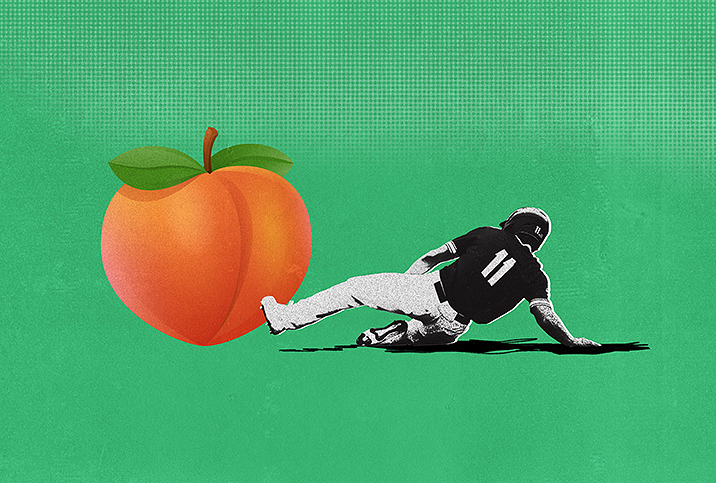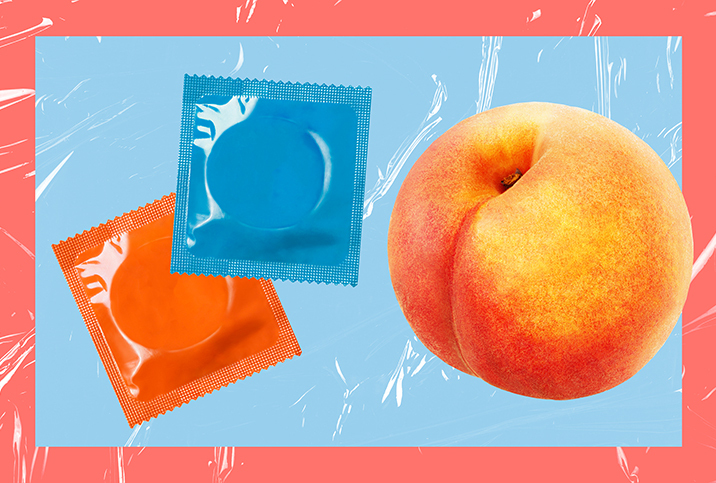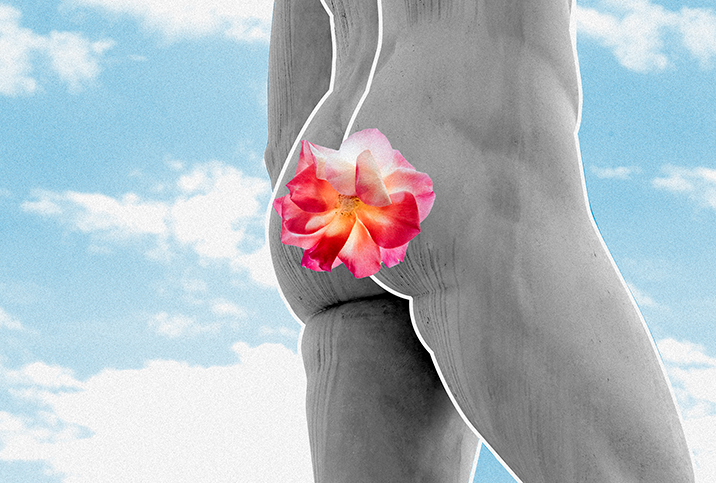The Ins and Outs of Anal Sex

Whether you're exploring something new for a special occasion or just curious about spicing up your sex life, you may have considered trying anal sex. Once regarded as taboo, the act is rapidly becoming mainstream, as more and more couples learn the pleasure it can bring regardless of gender or orientation. If you're on the fence but wary of potential obstacles, or you've decided to take the plunge and need to know your next steps, it's time to take a close look at safety and preparation for anal sex.
Getting started
Anal sex is technically defined as the insertion of fingers, a penis or another object into the anus for the purpose of sexual gratification. Analingus, also known as rimming, is the oral stimulation of the anus. Both can be immensely satisfying between consenting partners who take proper precautions.
"Anal sex can be great fun and incredibly enjoyable if you take the time to do it right," said Katie Lasson, clinical psychologist and relationship advisor working for Dimepiece LA, which sells adult products. "Some people like to be stimulated elsewhere, such as their clitoris or penis, as well as anally. This can help a person to relax into the new sensation of anal sex."
Physiologically, anal penetration involves the breaching of two sphincter muscles full of nerve endings, making for an intense experience. The first sphincter is the one you can see—the outer opening—and the second is just over an inch inside. Beyond that lies the rectum (4 to 6 inches deep), where feces are stored before expulsion. Rectal penetration is possible with a bit of practice, but it's not recommended to go beyond the rectum toward the colon, because of the risk of internal complications.
"If the person experiences bleeding or ongoing pain during or after anal sex, they should consult a medical practitioner to ensure no damage has been done to the rectum," said Federica Zamboni, registered psychologist and founder of Tailoring Therapy in Australia. She noted hemorrhoids and anal fissures as conditions that can make anal sex more painful.
"It's important to remember no amount of preparation will ensure that anal sex will be pleasurable; sometimes it's just not that person's cup of tea and that's completely OK," she continued. "People need to remember that consent can always be withdrawn, and so if they find anal sex painful or simply change their mind, they can and should stop."
Think vaginal sex...for the first time
"If it's your first time receiving anal sex and you haven't previously used toys anally, it's important to understand that the dynamics are similar to having vaginal sex the first time—it can hurt," said Jacqui Olliver, an author and relationship specialist in New Zealand who founded the Psychosexual Alignment method, which helps people consciously control their mental, emotional and physical (including sexual) processes.
Both the vagina and the anus have a muscle that needs to be relaxed for smooth penetration, though that of the anus is more resistant. The vagina is self-sufficient in producing its own lubrication, whereas the anus is not.
The anus and vagina are similar in that they are both designed for elasticity. The vagina has to be large enough to allow the passage of a baby, while the anus regularly stretches to release feces. Both revert back to their original states afterward to keep everything contained until they are required to expand again.
"Unlike vaginal sex, anal sex is not something someone should try on a whim," said Evan Goldstein, D.O., CEO and founder of Bespoke Surgical, with offices in New York and Los Angeles, as well as inventor of several products designed specifically for anal sex via his company Future Method.
Don't get caught up the creek without a paddle
While it's important to prepare yourself mentally and physically, you also need to equip yourself with the right tools and materials, whether you're a novice or a seasoned pro. "To prepare for anal sex, it's important to arm yourself with consent, lubricant and lots of patience," Zamboni said.
Being prepared minimizes hazards all around. Minor tweaks can go a long way.
"From a physical perspective, most people don't know that the angle of their pelvic floor plays a huge part in experiencing pain or pleasure," Goldstein said. "A simple adjustment, using a pillow or another kind of prop, can provide a better angle for penetration."
Paramount to pleasure, the first step before considering any angles or helpful accessories, is lubrication. While Olliver mentioned coconut oil because of its antibacterial qualities, most recommendations were for water- or silicone-based lube. However, note that silicone lube comes with certain drawbacks.
"Often, people avoid silicone lube because it can be a pain in the ass—no pun intended—to wash off," Goldstein said, adding that another issue is compatibility, because silicone lube cannot be used on toys also made of silicone, as they damage the material.
All experts agreed that a lack of lubrication can lead to friction, tearing the fragile skin inside the anus and increasing the chances of infection.
Before any kind of anal play, Goldstein recommended lathering both the penetrative object and the anus itself with lubrication of your choice, reapplying often as needed. This can be a messy business, so towels, wet wipes and anal-specialized products are also useful to keep on hand for cleanup.
Condoms are essential
Even though pregnancy is not a factor, condoms are imperative for protection against sexually transmitted diseases and infections (STDs/STIs).
"The risk of contracting an STI from anal sex is far higher than vaginal sex," Lasson explained. "People often don't use condoms for anal sex as they know there is no risk of pregnancy, but they forget that there is still a high risk of getting an STI."
Recently, the Food and Drug Administration made history by authorizing the marketing of ONE Condoms as the first specifically indicated to reduce chances of STIs through anal intercourse. This landmark decision was an important safety message to anyone planning to have anal sex.
"A lot of medical experts said they believed having an FDA-approved condom for anal sex might increase condom usage during anal sex, and I sure hope it does, but for now, I'm cautiously optimistic," Goldstein said.
He noted that contributing factors to the recent decline in condom usage were the lack of that FDA approval, and the advent of PrEP, or pre-exposure prophylaxis, in combination with the knowledge that HIV can't be transmitted when levels are undetectable. Additionally, people are understandably less likely to use condoms when they are not immediately accessible.
Size up
When you're thinking of trying anal sex, experts recommend starting off by using fingers or toys, such as butt plugs, anal beads and prostate massagers. Larger objects, such as a penis, should be introduced later when you have some experience with smaller items. There are various anal training/dilation kits available for beginners, typically consisting of three butt plugs in different lengths and girths, and instructions on how to graduate from one to the other.
Goldstein recommended starting dilation exercises four to six weeks ahead of having anal sex, using anal plugs of each size for about two weeks and wearing them a few minutes a day a couple of times a week. Both he and Lasson noted another benefit of this routine is that because most people carry out this procedure independently, they can adjust to the sensation and learn their preferences without the pressure of performance. Additionally, the way you position yourself can make a significant impact.
"Different positions are experienced differently by different people. By maintaining open and clear communication, partners can try different positions for penetration and find the one they enjoy the most," Zamboni advised.
For a more comfortable position, Goldstein suggested starting out with the bottom on top—as in cowboy/cowgirl position—because they maintain control of depth and speed.
Though Olliver mentioned cleanliness and hygiene as imperative to preventing infection, it is advised to omit douching, which uses liquids within the rectum to cleanse the cavity by inducing a bowel movement.
"It is important to not overdo it, as cleaning the anus is not needed physiologically and it could negatively impact the bacterial flora of the rectum," Zamboni said.
"I recommend avoiding enemas and tap water because they can dehydrate the cells in your rectum," Goldstein said. "We also noticed that improper douching and most water-based lubricants can cause changes in the anal and rectal microbiome, and this is indeed associated with the onset of more anal issues."
Make the most of it
Anal sex should never be a painful experience. Partners should emphasize communication in all directions throughout the session, including having a safe word in case either party is uncomfortable or in pain, Lasson said.
"I find the happiest clients are those who identify their wants and needs and communicate them openly and honestly with their partners," Goldstein explained.
"Understand that if your partner is mentally or emotionally stressed, their body will be tense and penetration will be more difficult for both partners and potentially painful," Olliver advised. "Breathe slowly and focus your attention on 'opening' and receiving your partner."
All experts recommended starting with a slow, even rhythm. If there are any problems at all, don't dismiss them.
"If you bleed from your anus whilst having anal sex, that is a huge red flag," Lasson said. "If you see blood, stop immediately and don't engage in anal sex again for at least a week to allow yourself time to heal."
Olliver recommended seeking medical advice if the bleeding becomes regular.
"Don't use pornography as a 'how-to guide' to anal sex. Most videos either go way too fast or don't show the preparation, and hardly any show the use of lubricant," Zamboni said. "Also, a lot of videos may show the penis penetrating the anus and then the vagina and vice versa—without a condom or using the same condom—and that has to be avoided to prevent infections."
"Too often, anal sex is ignored, and with more and more people exploring anal play, the sex care industry is ripe for innovation," Goldstein concluded. "With large gaps to fill, and as medical professionals, we must be willing to meet people where they are."


















